Abstract
Mutation of the p53 gene is reported to be of prognostic importance in colorectal carcinomas. Immunohistochemical staining of the accumulated p53 gene product may be a simple alternative for p53 mutation analysis. Previous studies addressing the prognostic importance of p53 expression, however, yielded contradictory results. Therefore, we evaluated the importance of p53 expression as a marker for long-term prognosis in a well-characterised study population of 109 colorectal carcinomas. After antigen retrieval with target unmasking fluid (TUF), immunostaining of p53 was performed with both monoclonal antibody DO7 and polyclonal antibody CM1. Objective quantification of the p53 signal was assessed by a computerised image analyser. p53 expression was higher in non-mucinous tumours than in mucinous tumours (p53 labelling index = 30% and 17% respectively, P = 0.05), and in metastatic tumours compared with non-metastatic tumours (p53 labelling index = 37% and 22% respectively, P = 0.05). Other histopathological features were not related to p53 expression. In multivariate analysis, Dukes' stage (P = 0.02) and histological grade (P = 0.05) stood out as independent markers for prognosis. p53 expression was not an independent marker for prognosis. At present, p53 expression is not a useful marker for long-term prognosis. Further insight into the relationship between p53 mutations and p53 expression is needed to elucidate more precisely the clinical relevance of p53 alterations.
Full text
PDF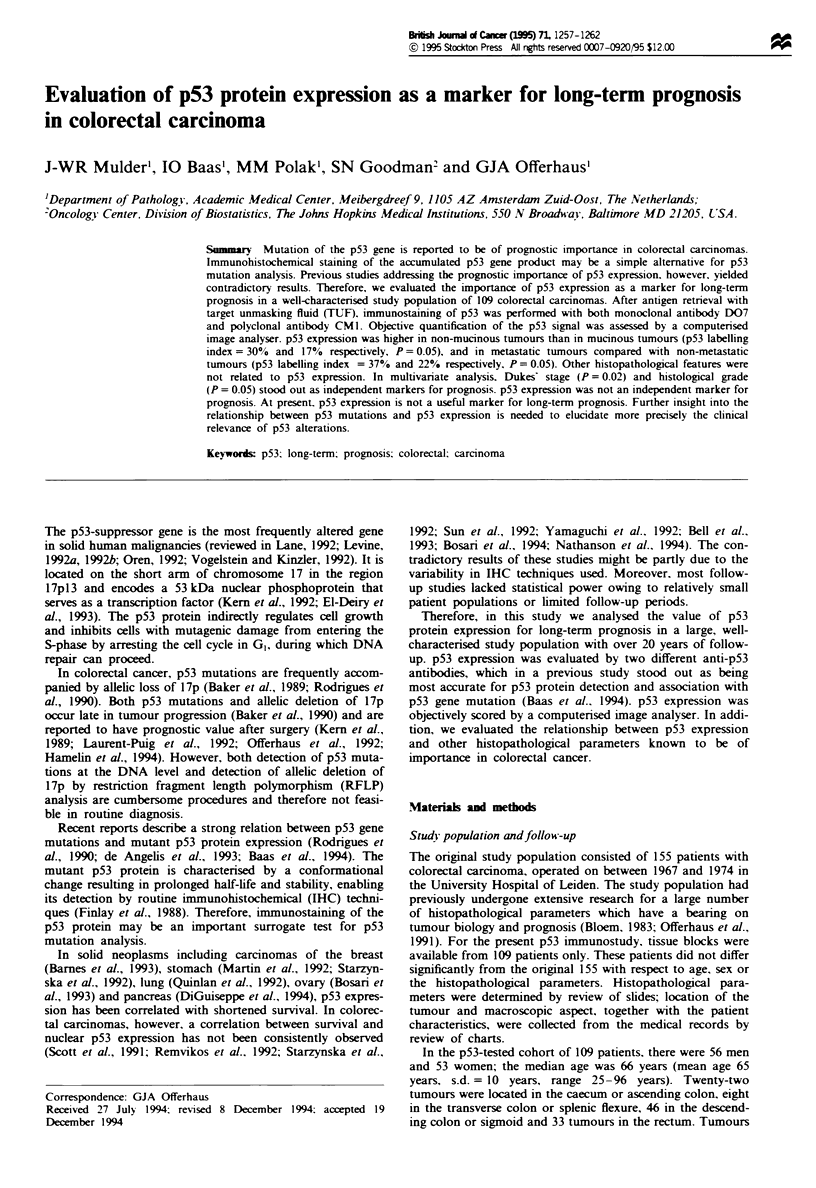
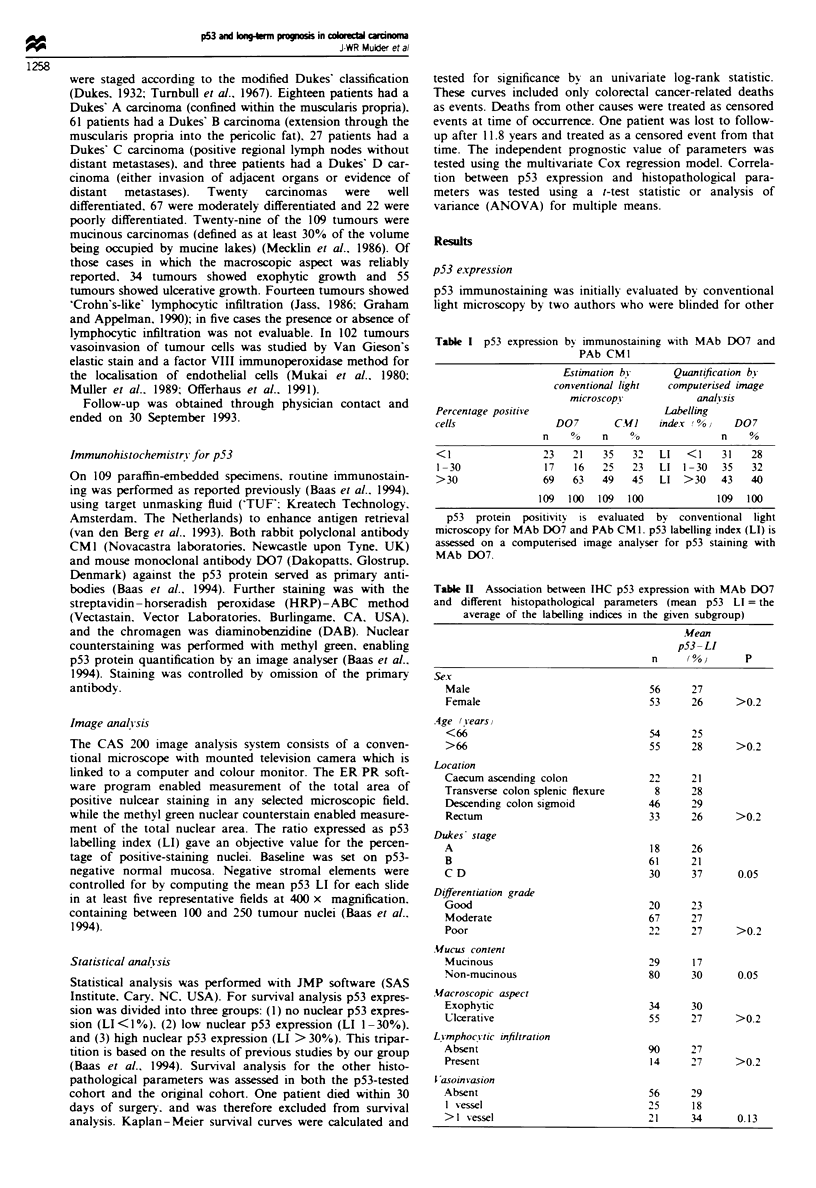
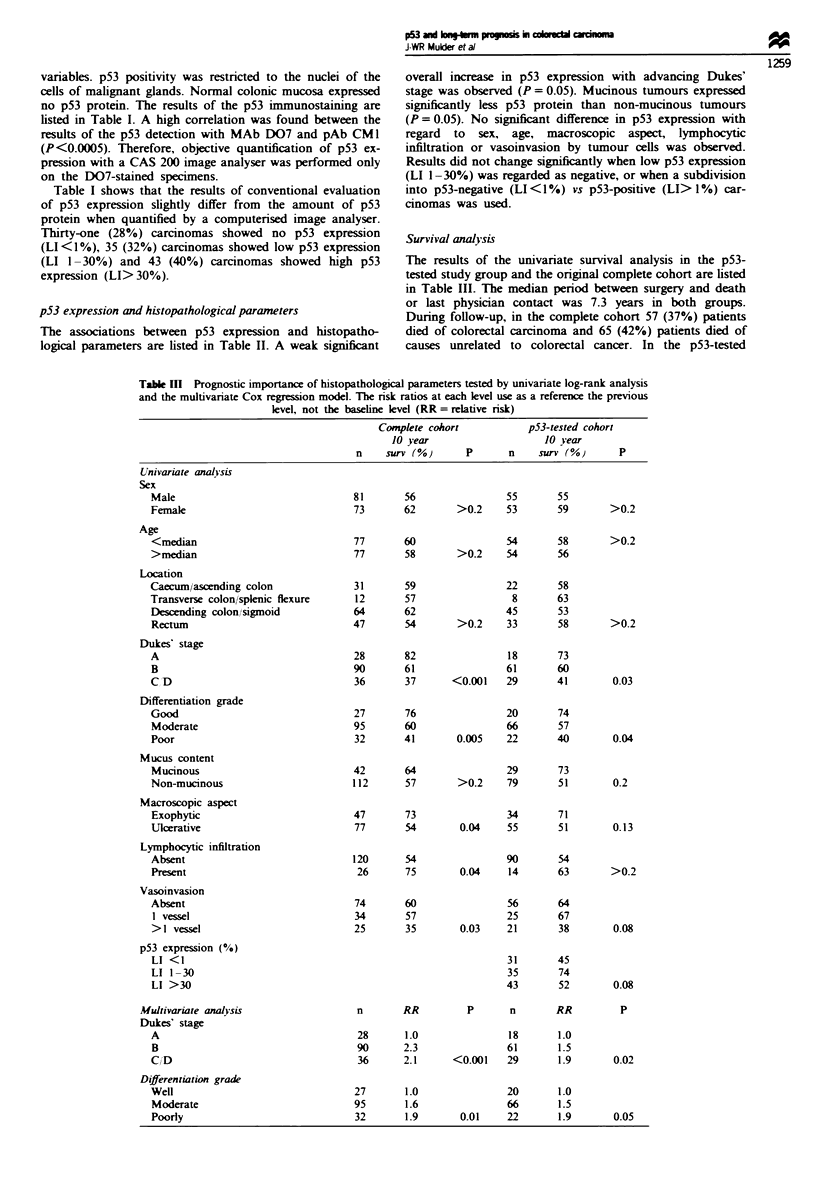
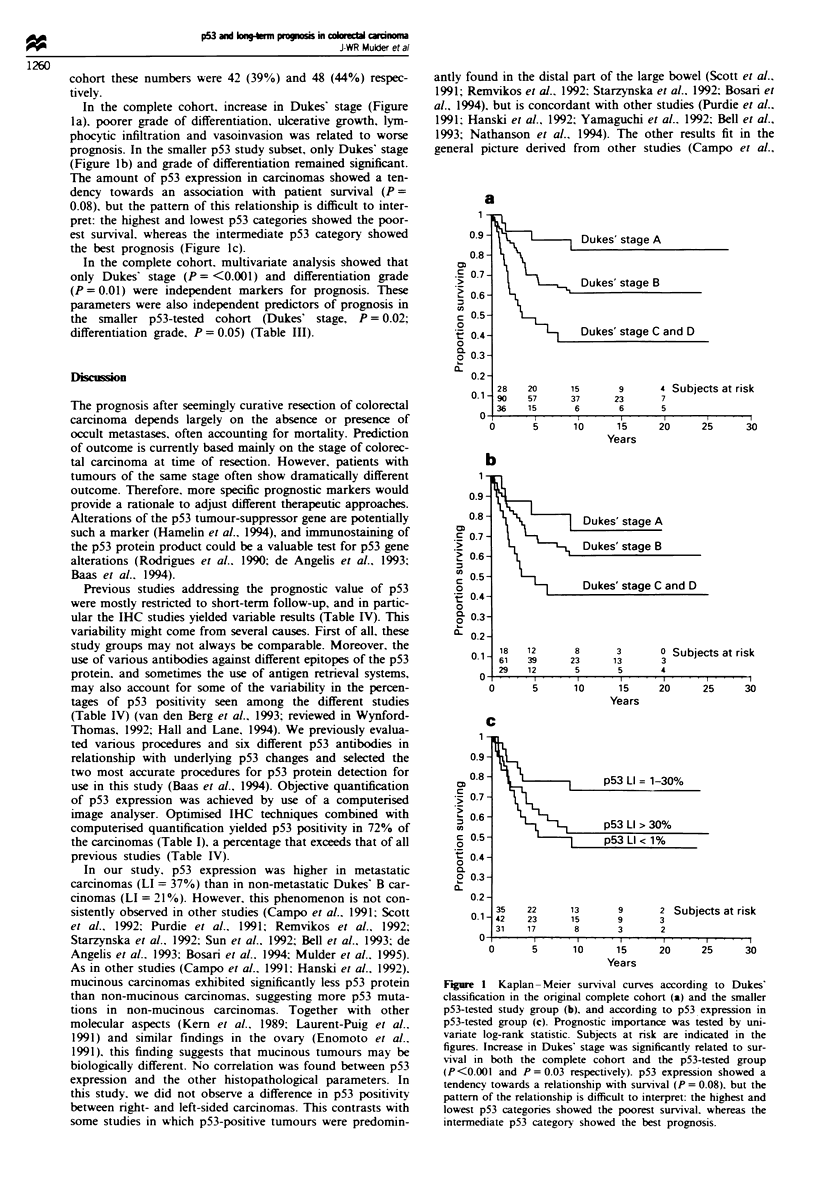
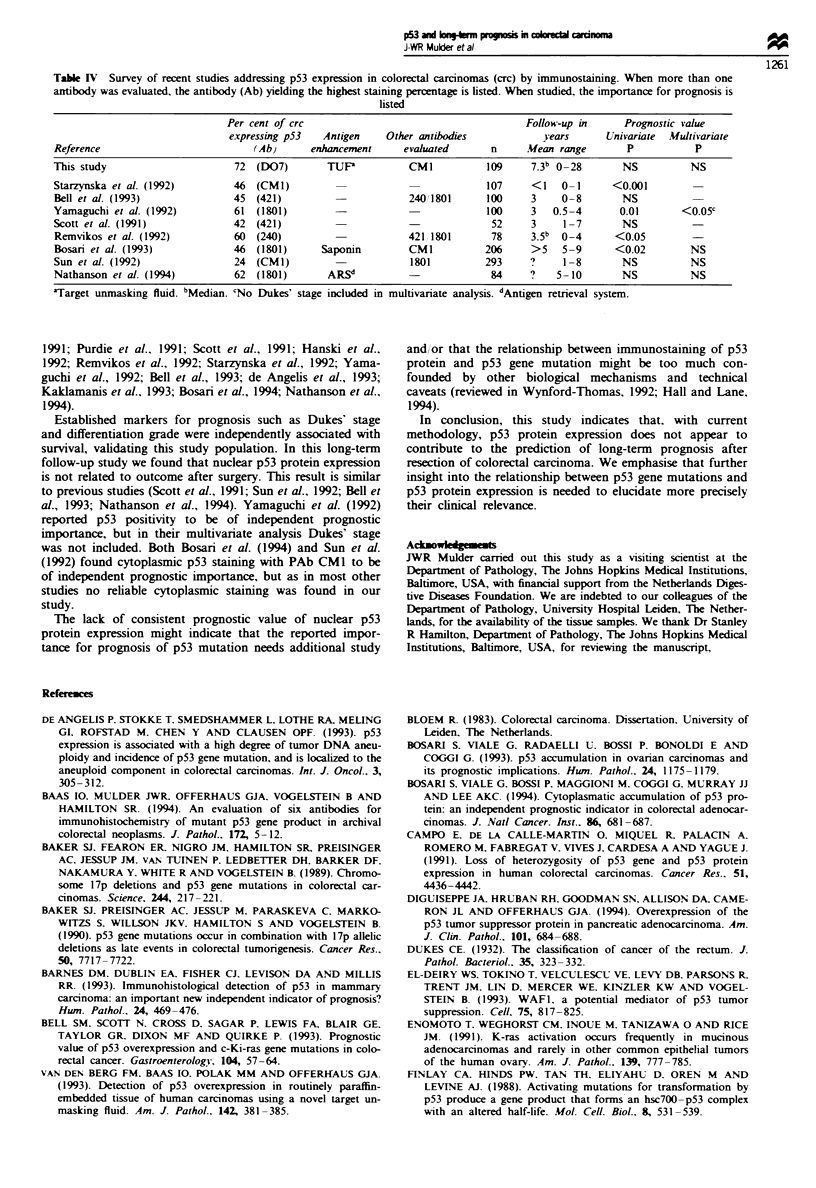
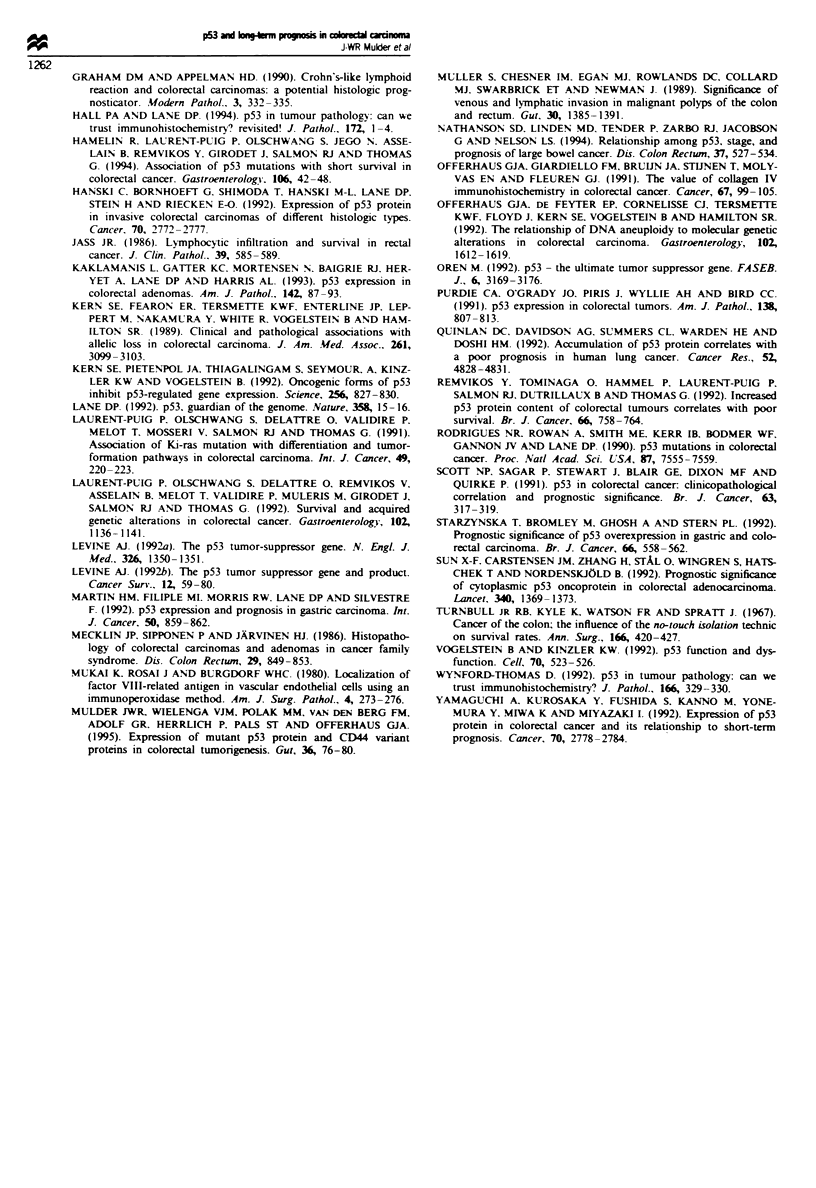
Selected References
These references are in PubMed. This may not be the complete list of references from this article.
- Baas I. O., Mulder J. W., Offerhaus G. J., Vogelstein B., Hamilton S. R. An evaluation of six antibodies for immunohistochemistry of mutant p53 gene product in archival colorectal neoplasms. J Pathol. 1994 Jan;172(1):5–12. doi: 10.1002/path.1711720104. [DOI] [PubMed] [Google Scholar]
- Baker S. J., Fearon E. R., Nigro J. M., Hamilton S. R., Preisinger A. C., Jessup J. M., vanTuinen P., Ledbetter D. H., Barker D. F., Nakamura Y. Chromosome 17 deletions and p53 gene mutations in colorectal carcinomas. Science. 1989 Apr 14;244(4901):217–221. doi: 10.1126/science.2649981. [DOI] [PubMed] [Google Scholar]
- Baker S. J., Preisinger A. C., Jessup J. M., Paraskeva C., Markowitz S., Willson J. K., Hamilton S., Vogelstein B. p53 gene mutations occur in combination with 17p allelic deletions as late events in colorectal tumorigenesis. Cancer Res. 1990 Dec 1;50(23):7717–7722. [PubMed] [Google Scholar]
- Barnes D. M., Dublin E. A., Fisher C. J., Levison D. A., Millis R. R. Immunohistochemical detection of p53 protein in mammary carcinoma: an important new independent indicator of prognosis? Hum Pathol. 1993 May;24(5):469–476. doi: 10.1016/0046-8177(93)90158-d. [DOI] [PubMed] [Google Scholar]
- Bell S. M., Scott N., Cross D., Sagar P., Lewis F. A., Blair G. E., Taylor G. R., Dixon M. F., Quirke P. Prognostic value of p53 overexpression and c-Ki-ras gene mutations in colorectal cancer. Gastroenterology. 1993 Jan;104(1):57–64. doi: 10.1016/0016-5085(93)90835-z. [DOI] [PubMed] [Google Scholar]
- Bosari S., Viale G., Bossi P., Maggioni M., Coggi G., Murray J. J., Lee A. K. Cytoplasmic accumulation of p53 protein: an independent prognostic indicator in colorectal adenocarcinomas. J Natl Cancer Inst. 1994 May 4;86(9):681–687. doi: 10.1093/jnci/86.9.681. [DOI] [PubMed] [Google Scholar]
- Bosari S., Viale G., Radaelli U., Bossi P., Bonoldi E., Coggi G. p53 accumulation in ovarian carcinomas and its prognostic implications. Hum Pathol. 1993 Nov;24(11):1175–1179. doi: 10.1016/0046-8177(93)90212-y. [DOI] [PubMed] [Google Scholar]
- Campo E., de la Calle-Martin O., Miquel R., Palacin A., Romero M., Fabregat V., Vives J., Cardesa A., Yague J. Loss of heterozygosity of p53 gene and p53 protein expression in human colorectal carcinomas. Cancer Res. 1991 Aug 15;51(16):4436–4442. [PubMed] [Google Scholar]
- DiGiuseppe J. A., Hruban R. H., Goodman S. N., Polak M., van den Berg F. M., Allison D. C., Cameron J. L., Offerhaus G. J. Overexpression of p53 protein in adenocarcinoma of the pancreas. Am J Clin Pathol. 1994 Jun;101(6):684–688. doi: 10.1093/ajcp/101.6.684. [DOI] [PubMed] [Google Scholar]
- Enomoto T., Weghorst C. M., Inoue M., Tanizawa O., Rice J. M. K-ras activation occurs frequently in mucinous adenocarcinomas and rarely in other common epithelial tumors of the human ovary. Am J Pathol. 1991 Oct;139(4):777–785. [PMC free article] [PubMed] [Google Scholar]
- Finlay C. A., Hinds P. W., Tan T. H., Eliyahu D., Oren M., Levine A. J. Activating mutations for transformation by p53 produce a gene product that forms an hsc70-p53 complex with an altered half-life. Mol Cell Biol. 1988 Feb;8(2):531–539. doi: 10.1128/mcb.8.2.531. [DOI] [PMC free article] [PubMed] [Google Scholar]
- Graham D. M., Appelman H. D. Crohn's-like lymphoid reaction and colorectal carcinoma: a potential histologic prognosticator. Mod Pathol. 1990 May;3(3):332–335. [PubMed] [Google Scholar]
- Hamelin R., Laurent-Puig P., Olschwang S., Jego N., Asselain B., Remvikos Y., Girodet J., Salmon R. J., Thomas G. Association of p53 mutations with short survival in colorectal cancer. Gastroenterology. 1994 Jan;106(1):42–48. doi: 10.1016/s0016-5085(94)94217-x. [DOI] [PubMed] [Google Scholar]
- Hanski C., Bornhoeft G., Shimoda T., Hanski M. L., Lane D. P., Stein H., Riecken E. O. Expression of p53 protein in invasive colorectal carcinomas of different histologic types. Cancer. 1992 Dec 15;70(12):2772–2777. doi: 10.1002/1097-0142(19921215)70:12<2772::aid-cncr2820701208>3.0.co;2-5. [DOI] [PubMed] [Google Scholar]
- Jass J. R. Lymphocytic infiltration and survival in rectal cancer. J Clin Pathol. 1986 Jun;39(6):585–589. doi: 10.1136/jcp.39.6.585. [DOI] [PMC free article] [PubMed] [Google Scholar]
- Kaklamanis L., Gatter K. C., Mortensen N., Baigrie R. J., Heryet A., Lane D. P., Harris A. L. p53 expression in colorectal adenomas. Am J Pathol. 1993 Jan;142(1):87–93. [PMC free article] [PubMed] [Google Scholar]
- Kern S. E., Fearon E. R., Tersmette K. W., Enterline J. P., Leppert M., Nakamura Y., White R., Vogelstein B., Hamilton S. R. Clinical and pathological associations with allelic loss in colorectal carcinoma [corrected]. JAMA. 1989 Jun 2;261(21):3099–3103. doi: 10.1001/jama.261.21.3099. [DOI] [PubMed] [Google Scholar]
- Kern S. E., Pietenpol J. A., Thiagalingam S., Seymour A., Kinzler K. W., Vogelstein B. Oncogenic forms of p53 inhibit p53-regulated gene expression. Science. 1992 May 8;256(5058):827–830. doi: 10.1126/science.1589764. [DOI] [PubMed] [Google Scholar]
- Laurent-Puig P., Olschwang S., Delattre O., Remvikos Y., Asselain B., Melot T., Validire P., Muleris M., Girodet J., Salmon R. J. Survival and acquired genetic alterations in colorectal cancer. Gastroenterology. 1992 Apr;102(4 Pt 1):1136–1141. [PubMed] [Google Scholar]
- Laurent-Puig P., Olschwang S., Delattre O., Validire P., Melot T., Mosseri V., Salmon R. J., Thomas G. Association of Ki-ras mutation with differentiation and tumor-formation pathways in colorectal carcinoma. Int J Cancer. 1991 Sep 9;49(2):220–223. doi: 10.1002/ijc.2910490213. [DOI] [PubMed] [Google Scholar]
- Levine A. J. The p53 tumor-suppressor gene. N Engl J Med. 1992 May 14;326(20):1350–1352. doi: 10.1056/NEJM199205143262008. [DOI] [PubMed] [Google Scholar]
- Martin H. M., Filipe M. I., Morris R. W., Lane D. P., Silvestre F. p53 expression and prognosis in gastric carcinoma. Int J Cancer. 1992 Apr 1;50(6):859–862. doi: 10.1002/ijc.2910500604. [DOI] [PubMed] [Google Scholar]
- Mecklin J. P., Sipponen P., Järvinen H. J. Histopathology of colorectal carcinomas and adenomas in cancer family syndrome. Dis Colon Rectum. 1986 Dec;29(12):849–853. doi: 10.1007/BF02555362. [DOI] [PubMed] [Google Scholar]
- Mukai K., Rosai J., Burgdorf W. H. Localization of factor VIII-related antigen in vascular endothelial cells using an immunoperoxidase method. Am J Surg Pathol. 1980 Jun;4(3):273–276. doi: 10.1097/00000478-198006000-00008. [DOI] [PubMed] [Google Scholar]
- Mulder J. W., Wielenga V. J., Polak M. M., van den Berg F. M., Adolf G. R., Herrlich P., Pals S. T., Offerhaus G. J. Expression of mutant p53 protein and CD44 variant proteins in colorectal tumorigenesis. Gut. 1995 Jan;36(1):76–80. doi: 10.1136/gut.36.1.76. [DOI] [PMC free article] [PubMed] [Google Scholar]
- Muller S., Chesner I. M., Egan M. J., Rowlands D. C., Collard M. J., Swarbrick E. T., Newman J. Significance of venous and lymphatic invasion in malignant polyps of the colon and rectum. Gut. 1989 Oct;30(10):1385–1391. doi: 10.1136/gut.30.10.1385. [DOI] [PMC free article] [PubMed] [Google Scholar]
- Nathanson S. D., Linden M. D., Tender P., Zarbo R. J., Jacobsen G., Nelson L. T. Relationship among p53, stage, and prognosis of large bowel cancer. Dis Colon Rectum. 1994 Jun;37(6):527–534. doi: 10.1007/BF02050985. [DOI] [PubMed] [Google Scholar]
- Offerhaus G. J., De Feyter E. P., Cornelisse C. J., Tersmette K. W., Floyd J., Kern S. E., Vogelstein B., Hamilton S. R. The relationship of DNA aneuploidy to molecular genetic alterations in colorectal carcinoma. Gastroenterology. 1992 May;102(5):1612–1619. doi: 10.1016/0016-5085(92)91721-f. [DOI] [PubMed] [Google Scholar]
- Offerhaus G. J., Giardiello F. M., Bruijn J. A., Stijnen T., Molyvas E. N., Fleuren G. J. The value of immunohistochemistry for collagen IV expression in colorectal carcinomas. Cancer. 1991 Jan 1;67(1):99–105. doi: 10.1002/1097-0142(19910101)67:1<99::aid-cncr2820670119>3.0.co;2-k. [DOI] [PubMed] [Google Scholar]
- Oren M. p53: the ultimate tumor suppressor gene? FASEB J. 1992 Oct;6(13):3169–3176. doi: 10.1096/fasebj.6.13.1397838. [DOI] [PubMed] [Google Scholar]
- Purdie C. A., O'Grady J., Piris J., Wyllie A. H., Bird C. C. p53 expression in colorectal tumors. Am J Pathol. 1991 Apr;138(4):807–813. [PMC free article] [PubMed] [Google Scholar]
- Quinlan D. C., Davidson A. G., Summers C. L., Warden H. E., Doshi H. M. Accumulation of p53 protein correlates with a poor prognosis in human lung cancer. Cancer Res. 1992 Sep 1;52(17):4828–4831. [PubMed] [Google Scholar]
- Remvikos Y., Tominaga O., Hammel P., Laurent-Puig P., Salmon R. J., Dutrillaux B., Thomas G. Increased p53 protein content of colorectal tumours correlates with poor survival. Br J Cancer. 1992 Oct;66(4):758–764. doi: 10.1038/bjc.1992.352. [DOI] [PMC free article] [PubMed] [Google Scholar]
- Rodrigues N. R., Rowan A., Smith M. E., Kerr I. B., Bodmer W. F., Gannon J. V., Lane D. P. p53 mutations in colorectal cancer. Proc Natl Acad Sci U S A. 1990 Oct;87(19):7555–7559. doi: 10.1073/pnas.87.19.7555. [DOI] [PMC free article] [PubMed] [Google Scholar]
- Scott N., Sagar P., Stewart J., Blair G. E., Dixon M. F., Quirke P. p53 in colorectal cancer: clinicopathological correlation and prognostic significance. Br J Cancer. 1991 Feb;63(2):317–319. doi: 10.1038/bjc.1991.74. [DOI] [PMC free article] [PubMed] [Google Scholar]
- Starzynska T., Bromley M., Ghosh A., Stern P. L. Prognostic significance of p53 overexpression in gastric and colorectal carcinoma. Br J Cancer. 1992 Sep;66(3):558–562. doi: 10.1038/bjc.1992.314. [DOI] [PMC free article] [PubMed] [Google Scholar]
- Sun X. F., Carstensen J. M., Zhang H., Stål O., Wingren S., Hatschek T., Nordenskjöld B. Prognostic significance of cytoplasmic p53 oncoprotein in colorectal adenocarcinoma. Lancet. 1992 Dec 5;340(8832):1369–1373. doi: 10.1016/0140-6736(92)92558-w. [DOI] [PubMed] [Google Scholar]
- Turnbull R. B., Jr, Kyle K., Watson F. R., Spratt J. Cancer of the colon: the influence of the no-touch isolation technic on survival rates. Ann Surg. 1967 Sep;166(3):420–427. doi: 10.1097/00000658-196709000-00010. [DOI] [PMC free article] [PubMed] [Google Scholar]
- Vogelstein B., Kinzler K. W. p53 function and dysfunction. Cell. 1992 Aug 21;70(4):523–526. doi: 10.1016/0092-8674(92)90421-8. [DOI] [PubMed] [Google Scholar]
- Wynford-Thomas D. P53 in tumour pathology: can we trust immunocytochemistry? J Pathol. 1992 Apr;166(4):329–330. doi: 10.1002/path.1711660402. [DOI] [PubMed] [Google Scholar]
- Yamaguchi A., Kurosaka Y., Fushida S., Kanno M., Yonemura Y., Miwa K., Miyazaki I. Expression of p53 protein in colorectal cancer and its relationship to short-term prognosis. Cancer. 1992 Dec 15;70(12):2778–2784. doi: 10.1002/1097-0142(19921215)70:12<2778::aid-cncr2820701209>3.0.co;2-l. [DOI] [PubMed] [Google Scholar]
- el-Deiry W. S., Tokino T., Velculescu V. E., Levy D. B., Parsons R., Trent J. M., Lin D., Mercer W. E., Kinzler K. W., Vogelstein B. WAF1, a potential mediator of p53 tumor suppression. Cell. 1993 Nov 19;75(4):817–825. doi: 10.1016/0092-8674(93)90500-p. [DOI] [PubMed] [Google Scholar]
- van den Berg F. M., Baas I. O., Polak M. M., Offerhaus G. J. Detection of p53 overexpression in routinely paraffin-embedded tissue of human carcinomas using a novel target unmasking fluid. Am J Pathol. 1993 Feb;142(2):381–385. [PMC free article] [PubMed] [Google Scholar]


